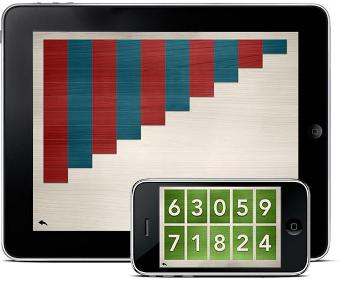 Bobby and June George have been making a name for themselves in the field of Montessori education for quite a while. They are the founders of The Baan Dek Montessori in Sioux Falls, South Dakota, the first school accredited by the Association Montessori International (AMI) in South Dakota.
Bobby and June George have been making a name for themselves in the field of Montessori education for quite a while. They are the founders of The Baan Dek Montessori in Sioux Falls, South Dakota, the first school accredited by the Association Montessori International (AMI) in South Dakota.
Recently, they have begun to develop iPad and iPhone applications based on Montessori materials, specifically the sandpaper letters and wooden math materials like the red rods. Called Montessorium, this idea has been met with some skepticism on the part of Montessori teachers and parents. I decided to talk to them about this new combination of Montessori and technology.
 Lori: What is the main idea behind the development of the Montessorium apps?
Lori: What is the main idea behind the development of the Montessorium apps?
Bobby & June: Montessorium was created by Montessori parents and an AMI-accredited Montessori teacher. The aim of this collaboration is increasing awareness of Montessori education by making the materials of Montessori available to children everywhere.
Lori: How did you conceive of the idea for Montessorium?
Bobby & June: While the Montessori community may be divided over what the next step in Montessori education should be, the world our parents, children and educators face every day is continually evolving with advancements in technology, as they drive to school, search on the internet, and communicate on blogs and forums.
We do not advocate or intend to replace the Montessori classroom; instead, we see this as a tremendous opportunity to address the convergence of technology with the tested and proven philosophy of Maria Montessori. We conceived of Montessorium as the next continuum in thinking about these complex issues.
Lori: What is the aim of the Montessorium apps – what do you hope they accomplish?
Bobby & June: Our commitment to education extends beyond the scope of any technology. It extends into an examination of the very ways in which we learn. We want to expose an entirely new generation to Montessori. We understand that our ideas are controversial, but we also see an unprecedented moment in the history of learning. Montessori education should not stop when the child leaves the classroom. It is our hope that Montessorium will education parents as well as children.
Lori: When I posted a link to your site on Facebook, many people responded negatively. They felt that “hands-on” materials can’t be translated to a screen. How do you answer this kind of objection?
Bobby & June: Anytime you combine a one hundred year old proven method of education with a ‘magical and revolutionary’ new device there is bound to be some discussion. We want to let our people know that we appreciate their comments and concerns and would like to take this opportunity to address them.
First, we do not advocate the replacement of the Montessori classroom. On the contrary, we are trying to introduce new families to the Montessori approach to early childhood education. We hope to highlight the importance of Montessori by exposing a new generation to the force of her thought. There is no substitute for the actual, physical materials or the social interactions that comprise a Montessori environment.
Second, we have carefully and thoughtfully translated the Montessori materials into iPhone and iPad applications. They are adherent to the Montessori philosophy of education. These applications are kinesthetic and proprioceptive, and use the audio, visual, and tactile senses of the child. They also address the sense of balance that Montessori found so important. Additionally, positive feedback systems are delicately put into place, and control of error offers the child an authentic Montessori experience.
Third, if Maria Montessori were alive today, we think that she would be at the Apple store, playing with an iPad, thinking hard about these complicated issues. She would be writing Steve Jobs letters, asking for advice. “What is this new gyroscope feature?” “Can we really duplicate the feel of sandpaper letters?” “Is it possible to create a positive feedback system?” In our opinion, Maria Montessori would be trying to open up and discover new ways to think about how we learn.
Lori: Something that occurred to me while thinking about this issue is that Maria Montessori would apply her scientific mind to this issue – rather than jumping to conclusions about the limits of technology, she’d observe children using the iPhone and iPad and draw conclusions based on their behavior rather than her own personal prejudices.
Bobby & June: Exactly. It is our belief that these apps will bring a new found awareness to the Montessori revolution in education. Montessorium will also allow an entirely different population to experience the brilliance of Montessori. Parents will Google Montessori and want to learn more. Existing Montessori students will return to the classroom with a renewed sense of joy and wonder. This could truly become Montessori for Everyone!
Lori: I like that idea! What will children specifically learn from your apps?
 Bobby & June: Intro to Math is specifically designed to introduce children to a concrete understanding of sequence, order, and ultimately, the basic components of mathematics, such as addition. Intro to Letters is meant to help children learn the alphabet, how to write, and ultimately, how to read.
Bobby & June: Intro to Math is specifically designed to introduce children to a concrete understanding of sequence, order, and ultimately, the basic components of mathematics, such as addition. Intro to Letters is meant to help children learn the alphabet, how to write, and ultimately, how to read.
Lori: What kind of feedback are you getting from other people?
Bobby & June: A parent summed it up best, “I look forward to this app since our children are VERY adept at using our iPad and iPhone – especially during long car trips and long waits at busy restaurants, doctor’s clinics, and in airports and on airplanes…all of which we have experienced in the past weeks. Our iPad has been engaging, educational, and fun – and if Scholastic can make some apps for preschoolers, why not Montessori? Hurry up! Get it done!”
As you can imagine, comments have ranged from one end of the spectrum to the other.
Lori: I’ve faced similar challenges when it comes to updating the Montessori materials. Sometimes people have a hard time with that.
Bobby & June: In our estimations, the relevance of Montessori no longer rests with Maria Montessori. It rests with us. Are we willing to engage in serious and complicated discussions? Are we willing to reassess the very ways in which children learn? What is the future of Montessori?
Lori: I can see that this goes beyond the development of Montessori-based apps and touches on the future of Montessori and technology. I think it deserves more discussion so maybe in the future we can talk again. Thank you so much for taking the time to talk to me about the thought process behind your new apps.
Bobby & June: You are very welcome!
Please visit Montessorium if you’re interested in learning more about this project. From their website you can follow and fan them on Twitter and Facebook.
The Math App is now available at the iTunes store: Montessorium Math App for iPhones.

